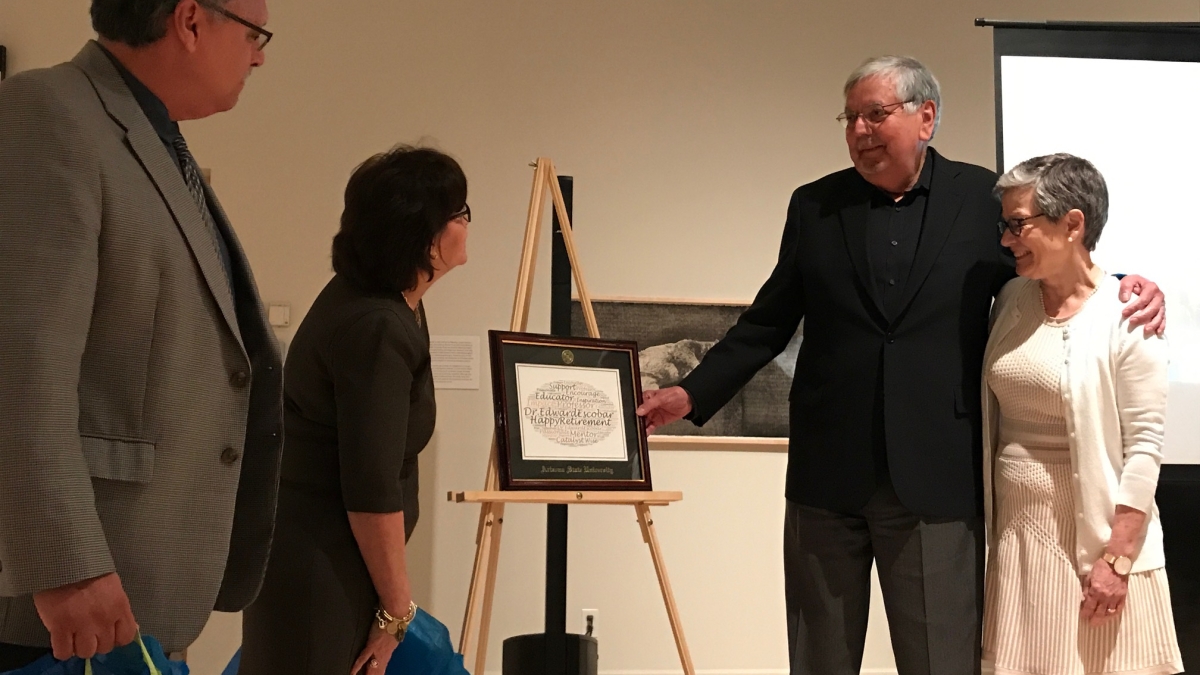An anniversary and a retirement celebration at the School of Transborder Studies

Twenty years after he helped establish the Department of Chicano/aChicano/a refers to a person of Mexican origin or descent. Latino/a refers to a person of Latin American origin or descent, not just Mexico. Studies at ASU, Associate Professor Edward Escobar listened as friends and colleagues reflected on his accomplishments and bid him farewell.
Several speakers at the ASU Art Museum became emotional Friday as they recounted the impact Escobar had on everyone from professors to administrators to students.
“Ed has three defining characteristics,” said Regents’ Professor Carlos Velez-Ibanez said — commitment, ferociousness and humanity. "You made it possible for us to move from what was then the Chicano/a Studies department to what we have now.”
Velez-Ibanez's comments connect what was then a fledgling department to the growing School of Transborder Studies, which includes student internship and study abroad opportunities, transborder-focused initiatives and programming, a speaker series, a teacher education program and a unique PhD program.
A native of Los Angeles and the son of Mexican immigrants, Escobar came to ASU in 1993 and immediately began advocating for the study and research of the Southwest’s considerable Chicano/a and Latino/a population. Four years later, in 1997, the Arizona Board of Regents approved the creation of the Department of Chicano/a Studies at ASU.
Over the years, Escobar watched as it grew into the Department of Chicano/a and Latino/a Studies in 2005, and then finally into the School of Transborder Studies in 2010.
“Thank you all for being here for this really moving celebration of what we’ve done over the last 24 years,” Escobar said. “It has been a privilege to be here and to work with all of you. This school is going to go on, and it’s a legacy I’m very proud of. … I know that the future is bright for our unit.”
Regents’ Professor Emeritus Cordelia Candelaria recalled how back in the early 1990s as discussions were underway to introduce Chicano/a studies to the university, she fought for Escobar to be considered as director. At the time, he was the first historian to have published an article on Chicano history in the Journal of American History.
Candelaria credited Escobar with helping to “break down the barriers and walls” Chicano/as faced in higher education at the time.
“This is the field of interdisciplinary studies, and ASU wanted to be there as the rocket shot off,” Candelaria said. “Ed had great plans and saw ASU for the great institution that it could be. That’s the kind of energy and belief and resolve that we needed.”
True to his colleagues’ words, Escobar’s passion for his work never faltered. Most recently, he was instrumental in the creation of the School of Transborder Studies’ first doctoral program — the only one of its kind in the country — which welcomed its first cohort in the fall of 2016.
Alejandro Lugo, current director of the school, worked alongside Escobar to establish the infrastructure of the doctoral program, developing the courses and outlining the requirements.
“I’m fortunate to have experienced his support, appreciation and kindness,” Lugo said. “He is a major intellectual and administrative presence, and I am going to miss him.”
Some time was taken during the reception to read comments from past students of Escobar’s. They ranged from humorous to heartfelt, with one student remarking, “He showed me what it was like to have people in my corner rooting for my success and what that success could look like.”
It has always been about the students first, Escobar said, calling them an inspiration and the thing that keeps him going.
“The students are the reason I got into this line of work to begin with,” he said.
Though Escobar is retiring, he made it clear that his work to better society through social change will not stop.
“I’m a chapter and a half away from finishing my next book,” he said. “And I know that this kind of work will continue because it’s who we are, and it’s who I am.”

